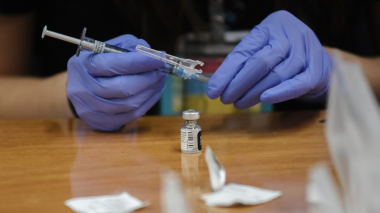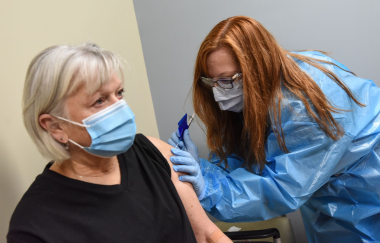So you went to that get-together at your friend’s house and now you’re feeling under the weather. You have the sniffles and you start to panic. Could it be COVID-19? Should you get tested?
Before Googling your symptoms (which won’t give you a definite answer as to whether or not you have the virus), let Dr. Lyn Nuse, MD, specialty medical director of general pediatrics at Atrium Health Levine Children's guide you on when and why to get a COVID-19 test.
What does “exposure” mean?
Just because your husband’s cousin’s uncle has COVID-19 and your husband was with your uncle 3 weeks ago, doesn’t mean you really need a test. “The Centers for Disease Control (CDC) gives us really clear guidance on what ‘exposure’ means,” says Dr. Nuse.
“They define it as being less than 6 feet away, unmasked, for a total of 15 minutes or more – that can be 15 minutes of cumulative time, not all at once – with someone who has a documented positive test for COVID-19.”
Other instances of “close contact” as defined by the CDC include: providing care to someone at home who has COVID-19, having direct physical contact (such as hugging or kissing) with someone with COVID-19, sharing eating/drinking utensils with someone who came down with the virus, or having a person with COVID-19 sneeze or cough on you.
But I don’t feel sick!
If you’ve had an exposure, even if you are symptom-free, you still need to get tested because you have a confirmed exposure and could spread COVID-19 to others before you start feeling symptoms (or you might remain asymptomatic, meaning you aren't experiencing any symptoms).
“If you’ve been exposed, generally – aside from getting a test – you should quarantine at home for 14 days,” Dr. Nuse advises. “If you receive a negative test result after day 7 (if you got tested on day 5 or later) after your known exposure, then you might be able to stop quarantining.”
Some people should also be able to stop quarantining after day 10 with no symptoms. When in doubt, consult with your healthcare provider who can make the best decision for you based on local conditions and other factors.
“Even if you ‘test out’ of quarantining, you should still stay home as much as possible, wear a mask around other people and observe social distancing guidelines for 14 days, just to make sure you’re not spreading the virus to others,” says Dr. Nuse.
So, when should I get a test?
If you were exposed tosomeone with a confirmed or suspected case of COVID-19, even if it was 24 to 48 hours before they developed symptoms, you should get tested for COVID-19 – even if you are asymptomatic.
“For example, if you know someone who got sick on a Monday, and you saw them on the Saturday before, that would be within 48 hours of them developing symptoms and would be considered an exposure,” explains Dr. Nuse. “If you saw them the Thursday before, it wouldn’t be considered an exposure.”
- If you’re fully vaccinated: Get tested 3 to 5 days after you were exposed to COVID-19. You don’t need to quarantine unless you test positive, but you do need to wear your mask consistently and follow social distancing recommendations.
- If you’re not fully vaccinated: Get tested and start to quarantine as soon as you find out about the exposure. If your first test is negative, get tested again 5 to 7 days later.
“You’ll get the most accurate results on day three to five of your symptoms, if you’re symptomatic,” says Dr. Nuse. “You can schedule an appointment a few days out to hit that optimal testing window if you know when you were exposed. But technically, you can get tested at any time.”
Other reasons you should get tested include:
- You have symptoms of COVID-19. Some symptoms include fever, cough, shortness of breath and loss of taste and/or smell. It’s a good idea to get tested if you feel sick, even if you’re fully vaccinated.
- If you were recently in a large group of people and you’re not fully vaccinated. You should get tested if you were around a lot of people and couldn’t stay 6 feet apart, including travel and large social gatherings.
- You need a confirmed negative test. You might be asked to show a negative test result for work, school or travel, or to attend an event where exposure to COVID-19 is a risk.
If you’re not sure if you should be tested, try our risk assessment tool, send a message to your care team on MyAtriumHealth, call your doctor or use one of the care options here.
I do actually feel really sick
Unfortunately, many symptoms of COVID-19 look a lot like the flu, allergies, or other ailments like strep or the common cold. To get the fastest treatment for what is actually going on, it’s best to consult your primary care doctor to have your symptoms evaluated. And, to be on the safe side, make sure you quarantine until you get a confirmed negative test or get further instructions from your doctor.
“We’re also offering video visits to anyone with COVID-19 types of symptoms,” adds Dr. Nuse. “You can have a video visit and see a doctor via telehealth, and then you can follow that up with an in-person visit or testing if necessary.” If you have symptoms like fever, chills, headaches, sore throat, congestion, cough, difficulty breathing, or gastrointestinal (GI) symptoms (stomach upset), it’s best to consult your doctor.
Whether or not you have symptoms…
When in doubt, stay home until you can see your doctor. “The information on COVID-19, and even testing, is changing rapidly,” says Dr. Nuse. “It’s difficult to keep up with the changing news, but healthcare providers are on top of it. Let us do the work for you and guide you through the types of tests you may need, and when and where to get them. We want to make it as easy as possible for you to get the care you need, so you can focus on feeling better.”
Where to get tested
- Drive-thru community testing sites: Our community testing sites offer drive-thru COVID-19 testing at convenient locations with no appointment needed. Testing is available for those ages 5 and older, and all children under 18 must be accompanied by an adult. For more information about our community testing sites and to find a location near you, visit online.
- Testing by appointment at area testing centers: If you prefer to set up a specific time to get tested, you can schedule an appointment at one of our area testing centers. Testing is available for those ages 5 and older, and all children under 18 must be accompanied by an adult. Find a location near you and schedule an appointment on MyAtriumHealth or call 704-468-8888.
- Testing by appointment at primary care offices: Testing is available at primary care offices by appointment for all ages, including those under 5. To schedule, contact your primary care provider’s office. If you don’t have a primary care provider, visit online to find one near you or call 704-468-8888.
Learn more about what to expect when you arrive for your COVID-19 test.
For more information on testing and care options for COVID-19, visit our resource hub online.



